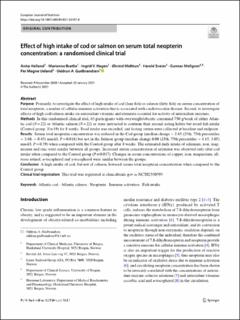Efect of high intake of cod or salmon on serum total neopterin concentration: a randomised clinical trial
Helland, Anita; Bratlie, Marianne; Hagen, Ingrid V.; Midttun, Øivind; Sveier, Harald; Mellgren, Gunnar; Ueland, Per Magne; Gudbrandsen, Oddrun Anita
Journal article, Peer reviewed
Published version

Åpne
Permanent lenke
https://hdl.handle.net/11250/2767319Utgivelsesdato
2021Metadata
Vis full innførselSamlinger
- Department of Clinical Medicine [2066]
- Registrations from Cristin [9791]
Sammendrag
Purpose
Primarily, to investigate the effect of high intake of cod (lean fish) or salmon (fatty fish) on serum concentration of total neopterin, a marker of cellular immune activation that is associated with cardiovascular disease. Second, to investigate effects of high cod/salmon intake on antioxidant vitamins and elements essential for activity of antioxidant enzymes.
Methods
In this randomised clinical trial, 63 participants with overweight/obesity consumed 750 g/week of either Atlantic cod (N = 22) or Atlantic salmon (N = 22) or were instructed to continue their normal eating habits but avoid fish intake (Control group, N = 19) for 8 weeks. Food intake was recorded, and fasting serum were collected at baseline and endpoint.
Results
Serum total neopterin concentration was reduced in the Cod group (median change − 2.65 (25th, 75th percentiles − 3.68, − 0.45) nmol/l, P = 0.018) but not in the Salmon group (median change 0.00 (25th, 75th percentiles − 4.15, 3.05) nmol/l, P = 0.59) when compared with the Control group after 8 weeks. The estimated daily intake of selenium, iron, magnesium and zinc were similar between all groups. Increased serum concentration of selenium was observed only after cod intake when compared to the Control group (P = 0.017). Changes in serum concentrations of copper, iron, magnesium, all-trans retinol, α-tocopherol and γ-tocopherol were similar between the groups.
Conclusion
A high intake of cod, but not of salmon, lowered serum total neopterin concentration when compared to the Control group.
